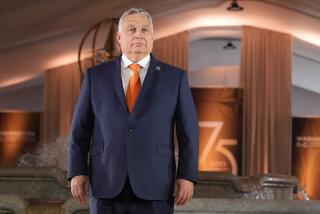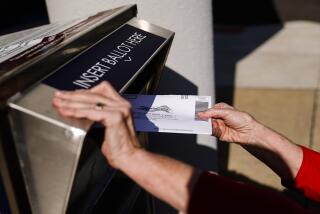EU observers to monitor Egyptian election
- Share via
Reporting from Cairo — The European Union said Monday it would fully monitor Egypt’s upcoming presidential election, in a reversal of reports that it would play a more limited role.
Over the weekend, news reports from Brussels had suggested that a delay by Egypt in allowing in telecommunications equipment and medical kits for the observers would curtail EU activities in connection with the vote, to be held next Monday and Tuesday.
But on Monday, Mario David, a member of the European Parliament and the chief observer, said the mission would go ahead despite observers not having been deployed well ahead of time across the country, as had earlier been envisaged.
“Thanks to joint efforts and the constructive engagement of the Egyptian authorities, I am pleased to announce that the [observer mission] is able to continue to observe the presidential election in Egypt as widely as possible throughout the country,” David told a news conference Monday.
David denied that Egypt had created obstacles to the European observers’ mission.
“I’m sure there was no intention whatsoever from the Egyptian authorities to block our work,” he said, citing “paperwork and bureaucratic steps.”
Egypt’s election body, the Presidential Elections Committee, had issued a statement late Sunday saying that its head, Anwar el-Asy, had held talks with the head of the EU delegation in order to facilitate the observers’ work. The delegation is set to make a preliminary assessment of the election two days after voting is complete.
Only two candidates are contesting the presidency: former Field Marshal Abdel Fattah Sisi, who quit his post as army chief in March to run as a civilian candidate, and liberal politician Hamdeen Sabahi.
Sisi, who led the coup that ousted Mohamed Morsi after enormous protests demanding the Islamist president’s removal, is officially endorsed by the army and is widely expected to outpoll his rival.
A number of other well-known international monitoring groups are staying away or curtailing their role in observing the Egyptian election.
The U.S.-based Carter Center, which observed the 2011 parliamentary and the 2012 presidential elections in Egypt, said last week that it was deploying a small expert mission focusing on the broader legal and political context, rather than attempting to observe election-day procedures.
The center said in a statement that is was concerned about the “restrictive political and legal context surrounding Egypt’s electoral process.” It cited the lack of a “genuinely competitive campaign environment” and political polarization that it said hampered a transition to democracy.
Hassan is a special correspondent.
More to Read
Sign up for Essential California
The most important California stories and recommendations in your inbox every morning.
You may occasionally receive promotional content from the Los Angeles Times.













